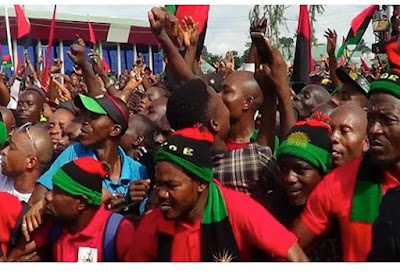Court awards N8bn damages to Kanu, says IPOB’s proscription illegal
Court awards N8bn damages to Kanu, says IPOB’s proscription illegal
The reliefs sought by Kanu are, “A declaration that the practical application of the Terrorism Prevention Act and the executive or administrative action of the respondents which directly led to the proscription of IPOB and its listing as a terrorist group, said IPOB being comprised of citizens of Nigeria of the Igbo and other Eastern Nigerian ethnic groups, professing the political opinion of self determination and the consequent arrest, detention and prosecution of Kanu as a member/leader of said IPOB, is illegal, unlawful, unconstitutional and amounts to infringement of the applicant’s fundamental right not to be subjected to any disabilities or restrictions on the basis of his ethnicity as enshrined and guaranteed under Section 42 of the Constitution of the Federal Republic of Nigeria, 1999 (as amended) and his fundamental rights as enshrined under Articles 2,3,19 & 20 of the African Charter on Human and People’s Rights (Enforcement and Ratification) Act.
“A declaration that self-determination is not a crime and thus cannot be used as a basis to arrest, detain and prosecute the applicant, Mazi Nnamdi Kanu
An order mandating and compelling the respondents, jointly or severally, to issue official letter(s) of apology to Kanu for the infringement of his said fundamental rights; and publication of said letter(s) of apology in three national dailies.
“An order mandating and compelling the respondents to, jointly or severally, pay the sum of N8,000,000,000.00 (Eight Billion Naira) to Kanu, being monetary damages claimed by the applicant against the respondents jointly and severally for the physical, mental, emotional, psychological, property and other damages suffered by the applicant as a result of the infringements of their fundamental rights by the respondents.”
Justice A.O. Onovo, while delivering the judgement, agreed with the applicant that the African Charter binds on Nigerian courts, hence self-determination is not a crime.
He held that the proscription is therefore unconstitutional.




Comments
Post a Comment